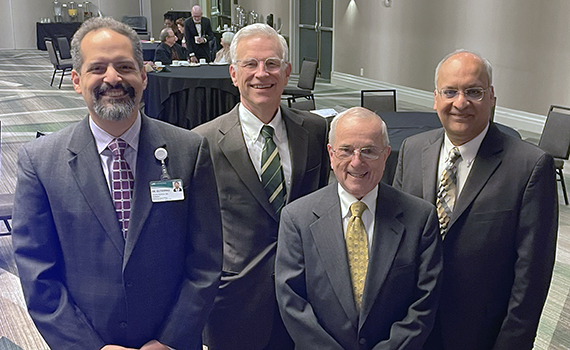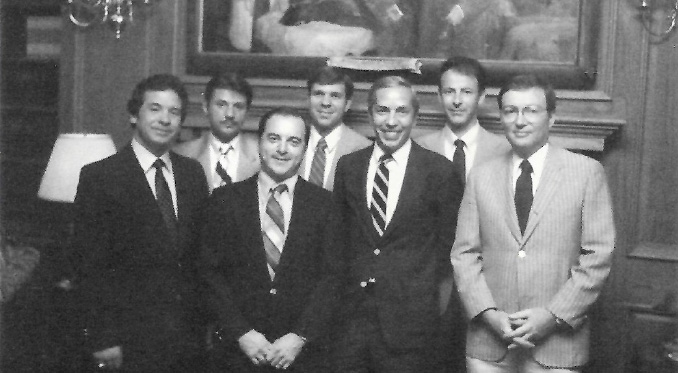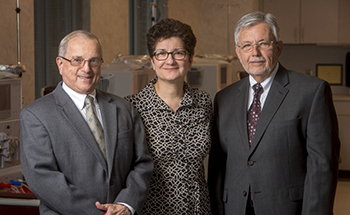By Carolyn Walsh, MA
 R to L: Drs. Orlando Gutierrez, Seth Landefeld, Ed Rutsky, Anupum Agarwal
R to L: Drs. Orlando Gutierrez, Seth Landefeld, Ed Rutsky, Anupum Agarwal
When Edwin “Ed” Rutsky, M.D., graduated from Case Western Reserve University Medical School in 1965, he wasn’t planning on becoming a career nephrologist. In fact, it would be seven more years before the American Board of Internal Medicine even offered certification in nephrology as a subspecialty of internal medicine.
Nor did he anticipate spending an additional 24 years as an internist after investing 28 years in nephrology. But Rutsky is a doctor with an abiding passion for taking great care of people. And he forged his own path to make a lasting difference in the lives of his patients and colleagues.
A fortuitous beginning
Rutsky recalls his first challenging encounter with renal physiology in his intern year of residency at Duke University. His patient had a pseudomonas infection that was “dissolving” her skin.
“She became a living hell in terms of fluid and electrolyte balance because she would weep through the skin, and you'd have to replace everything. It was very hard to keep up with,” Rutsky remembers. “I had consulted nephrology, and they thought I did a good job with that when I was an intern. So, when I was in my junior residency year, they offered me a fellowship in nephrology. Nobody else offered me anything. So, I said, ‘Okay. I'll try nephrology.’”
It was the fellowship that introduced him to Dr. Roscoe “Ike” R. Robinson who founded Duke’s nephrology division. “Dialysis and transplantation were the cutting edge of medicine at that time,” Rutsky says. And after a year in Robinson’s lab, Rutsky returned to Ohio to complete a Chief Residency at Case Western and Cleveland Metro General Hospital.
He also married Judith Morse that year, a woman Rutsky calls “remarkable” who has been at his side for nearly 55 years. He credits her love and loyalty as the foundation for his longevity as a physician. “Without Judy,” Rutsky says, “I couldn’t have invested in my patients the way I needed to.”
With his medical training completed, Rutsky joined the Navy, where he was stationed at Portsmouth Naval Hospital in Virginia. “And that's where I really learned how to be a doctor,” he says.
In Portsmouth, Rutsky ran a medical ward with a dialysis unit, “two machines and two corpsmen I never could find at night.” So, he learned to set up a dialysis machine on his own, do the arterial puncture and venous return, and run the machine during dialysis. As a result, he says, “I learned about dialysis thoroughly.”
It was also where Rutsky began to experience the camaraderie of academic medicine. “On the job, I ran a medical ward and did consults throughout the hospital for renal. I was part of an active teaching program there. Ike Robinson was one of our visiting professors who would come regularly, and we had a housestaff who were really anxious to learn. So, I gave multiple talks on a lot of different medical problems, helping my own education in the process,” he recalls.
A season of pivotal growth
 Division of Nephrology faculty c. 1979. LG Navar, D DiBona, EA Rutsky, JA Shafer, TE Andreoli, DW Ploth, SG Rostand (Missing SC Hebert, W McGuffin)
Division of Nephrology faculty c. 1979. LG Navar, D DiBona, EA Rutsky, JA Shafer, TE Andreoli, DW Ploth, SG Rostand (Missing SC Hebert, W McGuffin)
In 1971, Rutsky began looking for a place to practice after his stint in Portsmouth ended. He considered returning to Duke, but UAB had a nephrology program that was just getting off the ground. He threw in his lot with the legendary Dr. Thomas Andreoli to join the faculty here.
“My son Joshua had just been born at the Naval hospital for about $6.25,” Rutsky remembers. “He was about 6 months old when we came down here, screaming all the way in the back seat.”
As Rutsky began to settle in at UAB, he drove with Andreoli to Atlanta to take the very first Nephrology Subspecialty Board exam. Although they decided that they had answered at least half of the questions differently, both somehow passed the exam.
He was subsequently sent to Mayo Clinic to learn a radioimmunoassay technique for parathyroid hormone. But when another researcher in the division expressed interest in spending more time in the lab, Rutsky shifted his focus to clinical service on the hospital wards—a momentous decision in his career.
“I did not come off the wards for eight years. I rounded every day. And then when Steve (Rostand) came…we both rounded on our own patients daily,” Rutsky says.
He describes the work in those early days as one would typically define an intensivist’s role today—focused on caring for sick patients in the Intensive Care Unit. “If you had advanced chronic kidney disease or needed dialysis, you came to us straight out of the operating room for open heart surgery, orthopedic surgery, aortic aneurysm replacement. We took care of all of them in the ICU, so we took care of everything, including ventilator care for renal patients with pulmonary failure,” Rutsky says.
In addition to the challenge of working in the ICU, Rutsky also directed UAB’s home dialysis unit, managing close to 100 patients performing hemodialysis and peritoneal dialysis in their homes.
All the while, Rutsky actively recruited alongside Andreoli, Rostand and Dr. James A. Shaefer to bring new faculty to UAB. The division grew in size and renown, attracting extraordinary investigators like Drs. Luis Gabriel Navar and Donald Dibona, as well as clinical investigators like Dr. David Ploth. And since there were not many restaurants in town, they had dinner at each other’s houses. The faculty and their wives became like family to each other.
An investment in clinical scholarship
When Andreoli left UAB in 1979 to become Chair of the Department of Medicine at University of Texas Medical School in Houston, Rutsky stepped in as acting division director while the committee searched for a replacement. It wasn’t a role he enjoyed, he says, since he and his colleague Steve Rostand never wanted anything to do with management. “We wanted to be doctors,” he stresses.
When Robert “Robin” S. Luke, M.D., was named Andreoli’s successor, he made significant changes to the clinical nephrology practice. Rutsky remembers, “Robin talked us into not rounding every day and taking time off. You know, we still had to go to the clinic. We had to see our patients in the dialysis unit no matter what. But we didn't have to be daily inpatient attendings.”
While the change in workload meant less time in intensive care, it didn’t slow Rutsky down. Not only did he continue to practice nephrology and do some clinical investigation, he also served as a member of the Faculty Review and Promotion Committee in the Department of Medicine from 1983-1999.
At that time, it was very difficult for clinician educators to be promoted. At the request of the Department of Medicine Chair Dr. William Koopman, a group was formed including Drs. Glenn Cobbs, Gustavo “Tavo” Heudebert, Robert Kreisberg, Rutsky and others. The group’s charge was to find a way to facilitate promotion of clinical faculty at UAB. Part of the problem was that demonstrable scholarship was required for promotion, and that scholarship was largely defined by bench research or organized clinical trials.
Rutsky recalls Heudebert recommending a book on academic evaluation that, interestingly, had been written by Rutsky’s childhood friend Gene Maeroff. Scholarship Assessed: Evaluation of the Professoriate made the case that scholarship came in various forms. “We took that to mean that one could demonstrate scholarship in education such as developing innovative approaches to teaching and curriculum development. So, we rewrote the departmental promotion guidelines accordingly,” Rutsky says. The contribution may not immediately stand out on Rutsky’s curriculum vitae, but the work undoubtedly helped many clinicians establish their value to the academic enterprise.
A second wind for primary care
By 1997, with 28 years of service to his credit, Rutsky was ready for a change. “I retired from UAB in October of 1997 and became emeritus. And I worked out an agreement with David Warnock (Luke’s successor as division director) where I would stay in Nephrology, but I would not be on the Nephrology call schedule,” he explains.
With that bold move, Rutsky embarked on a second career as a primary care physician. He established care for roughly 1,000 patients—enough to pay for his office secretary and generate a modest salary.
“I worked, four or five half-days a week. And what happened was, it rejuvenated me. I was no longer burnt out. I have enjoyed it thoroughly. As an internist again, doing primary care with no research responsibilities. No administrative responsibilities. Just being a doctor,” Rutsky says.
After his emeritus appointment, the Department of Medicine looked for additional ways to honor Rutsky for his clinical contributions. And with that, the C. Glenn Cobbs/Edwin A. Rutsky Awards for Clinical Excellence were born. Each year, the faculty would vote to bestow the awards on doctors who were exemplary in the practice of medicine. It’s an award that is still a highlight of the department’s annual Faculty Honors Reception.
Rutsky remembers being recognized as alongside Cobbs, a beloved faculty member in the Division of Infectious Diseases, as a special distinction. “I mean, it was a big deal to both of us. It was a great honor,” he says.
A crowning achievement
 R to L: Drs. Edwin Rutsky, Azita Takeshian, and Fred Steading (2016)
R to L: Drs. Edwin Rutsky, Azita Takeshian, and Fred Steading (2016)
All along the way, Rutsky has established countless close personal relationships with both colleagues and patients—and colleagues who became his patients. It’s not unusual to mention someone in particular and hear him respond, “Oh yes. I took care of them, and their sister, too. And later their cousin and cousin’s son.” His stories are filled with rich details about their lives and connections, clearly illustrating his compassion for others and love for medicine.
It was just such a connection that led to the greatest honor of Rutsky’s career—the establishment of an endowed professorship in his honor.
Rutsky had worked early on with Fred Steading as a technical manager in the dialysis unit, and eventually took care of him as a patient. When Steading retired from UAB and went to work for DCI, the largest non-profit dialysis provider in the United States, he joined former nephrology trainee Dr. Azita Takeshian’s team. As the company performed well financially, the two conceived a plan to give a charitable gift in Rutsky’s name.
“The two of them walked into Nephrology rounds in the Frommeyer Conference Room, and I saw them come in. I said, ‘Well, why are they here?’” Rutsky recalls. “And they just got up and announced this. It was one of the few times in my life that I really couldn't say anything. I was speechless.”
Their generous gift established the DCI/Edwin A. Rutsky Endowed Professorship in Nephrology, which was eventually converted to an endowed chair. Rutsky says the philanthropy “wasn't because I was a great boss to him in the dialysis unit. Rather, it was because of our relationship as doctor and patient, doctor to his family, and eventually friend.”
To top it off, Rutsky saw one of his most accomplished trainees appointed as holder of the endowed role, Dr. Ashita Tolwani.
“Ashita went to medical school here, but I didn't meet her until she was on the housestaff, if I remember correctly. And then she became a fellow in nephrology. She and I bonded very quickly. She was incredibly smart and an incredibly good physician. I became kind of a father figure to her and mentor,” Rutsky says. “I could think of no one more deserving than her to occupy that chair.”
"Dr. Rutsky lived his values each day, leading with integrity and strength while creating a sense of belonging and worth for those around him. He took many with him in the slipstream of his success, lifting the institution and each of us," says Dr. Emmy Bell.
A fond “festschrift” farewell
On March 8, 2023, just weeks after Rutsky hung up his stethoscope for good, the Division of Nephrology hosted a “festschrift” in his honor, to celebrate 51 and a half years of service at UAB. The European custom for an academic sendoff featured lectures from many of his colleagues and fond memories of the past half century.
Dr. Rutsky epitomizes the kind of doctor we should all strive to be—meticulous, compassionate, and caring. He is an exceptional clinician, educator, mentor, and scholar. He taught me the importance of clinical observation, inspection, and attention to patient details and trends. He also taught me perseverance and resilience. His mentorship and guidance have been instrumental in shaping my career. — Dr. Ashita Tolwani, Professor, UAB Division of Nephrology
It is wonderful to celebrate Ed Rutsky as a preeminent physician, extraordinary teacher, and phenomenal clinical scholar. He is beloved by all his patients, and he is renowned as the teacher and trainer of many, not only in nephrology but across internal medicine. — Dr. Seth Landefeld, Professor and Chair, UAB Department of Medicine
Ed Rutsky has been influential in helping so many trainees choose careers in nephrology. And he was a great advisor to me in my tenure as division director. He doesn’t mince words. He tells you like it is. We are all so grateful for everything he has given to UAB in these 50 plus years. — Dr. Anupam Agarwal, Sr. Vice President for Medicine and Dean, UAB Heersink School of Medicine
And as he retires—for the second time—to his farm and his family, Rutsky considers it a privilege to have spent a half century at UAB.
“You have to understand that I got far more out of this than I gave. That's the way I feel,” he concludes.